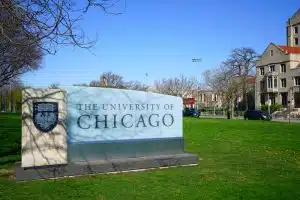Originally an athletic conference, the Ivy League now symbolizes prestige, academic excellence, and exclusivity. With recent Ivy acceptance rates of as low as 3.6% to 8.4% for the Class of 2028, admissions have never been more competitive. Tens of thousands of top students apply each year—so what does it take to stand out?
Getting into an Ivy League school is about setting yourself apart in a pool of equally accomplished applicants. So, what do Ivy Leagues look for? Let’s take a closer look at how you can meet (and exceed) their expectations—from academics to extracurriculars, essays, and beyond—to build a strong profile and maximize your chances of acceptance.
- What Do Ivy Leagues Look for in Academics?
- What Extracurriculars Do Ivy Leagues Look For?
- What Application Essays Do Ivy League Schools Look For?
- What Do Ivy League Schools Look for in Letters of Recommendation?
- Frequently Asked Questions
- Takeaways
What Do Ivy Leagues Look for in Academics?
Academics always come first. After all, Ivy League schools are built on intellectual rigor. However, beyond the numbers, these schools also seek students who push themselves academically, take on challenges, and show resilience when faced with setbacks. They want those who don’t shy away from intellectual challenges and a rigorous academic environment.
So, what do Ivy Leagues look for in these areas specifically? Let’s break down exactly what it takes to meet their academic expectations.
What GPA do you need for Ivy League schools?
Admissions officers at Ivy League schools look for students with near-perfect GPAs of 4.0 or higher. Your GPA—both weighted and unweighted—reveals not just your grades, but the rigor of your coursework.
So, why 4.0? A cumulative GPA of 4.0 or higher typically places a student in the top 5% to 10% of their class. While Ivy League schools don’t have a set minimum GPA, aiming for the average GPA benchmarks of Ivy League admits keeps you in a strong position:
|
Ivy League School |
National Ranking | Average GPA |
| 1 | 3.94 | |
| Harvard University | 3 |
4.2 |
| 5 |
4.1 |
|
| 10 |
3.9 |
|
| 11 (tie) |
4.1 |
|
| 13 (tie) |
3.9 |
|
| 13 (tie) |
3.9 |
|
| Dartmouth College | 15 (tie) |
3.9 |
However, a lower GPA isn’t an automatic rejection. Context matters. Strong test scores, leadership, or unique achievements can still keep you competitive.
Why does course rigor matter?
Ivy League admissions officers also look at the difficulty of your coursework. Advanced high school classes demonstrate your ability to handle college-level work, making them an important factor in assessing academic readiness.
How well you perform in the following rigorous courses can signal your preparedness for an Ivy League education:
|
Course type |
Duration | Difficulty Level | Weight on GPA | College Credit |
Key Features |
| 1 semester or 1 year | More challenging than regular classes, but less rigorous than AP/IB | +0.5 points | None |
Covers advanced material, but does not offer college credit |
|
| 1 semester or 1 year | College-level difficulty with subject-specific focus | +1.0 point | Yes (score-dependent) |
Ends with a standardized AP Exam (scored with a 1–5 scale) that may qualify for college credit or advanced placement |
|
| International Baccalaureate (IB) Classes |
2 years |
Most rigorous with interdisciplinary learning across six core subjects |
+1.0 point |
Yes (score-dependent) |
Requires exams (scored with 1–7 scale), research projects, and coursework for an IB diploma |
Still, taking on challenges should never come at the cost of strong grades. While taking as many advanced courses as possible may seem ideal, finding a balance is important. After all, overloading AP or IB courses without maintaining high performance can do more harm than good. Instead, aim for a course schedule that pushes your limits while allowing you to excel.
What SAT/ACT scores do Ivy Leagues look for?
With over 50,000 high-achieving students vying for a place in the Ivy League each year, sometimes the one factor that makes a student stand out for Ivy League admissions is their standardized test scores. While Ivy League schools evaluate applications holistically, a competitive SAT or ACT score can strengthen your academic profile and make you a more compelling candidate. That means aiming for:
- 700 or higher in both SAT sections (1500+ composite score)
- 34 to 36 overall on the ACT
While Ivy League schools don’t have official minimum score requirements, strong test scores demonstrate academic readiness and the ability to handle the rigor of your chosen Ivy. The following are the average test scores of each Ivy League school:
|
Ivy League School |
SAT Score Range (Middle 50%) |
ACT Score Range (Middle 50%) |
|
Princeton University |
1510 – 1560 | 34 – 35 |
| Harvard University | 1500 – 1580 |
34 – 36 |
|
Yale University |
1500 – 1560 | 33 – 35 |
| University of Pennsylvania | 1500 – 1570 |
34 – 35 |
|
Cornell University |
1480 1550 | 33 – 35 |
| Brown University | 1520 – 1570 |
34 – 36 |
|
Columbia University |
1500 – 1560 |
34 – 35 |
|
Dartmouth College |
1440 – 1560 |
32 – 35 |
Although some Ivy League schools—including Princeton, Yale, Cornell, and Columbia—remain test-optional, this may not last forever. As more institutions reinstate test requirements, earning a competitive SAT or ACT score can be a major advantage.
What Extracurriculars Do Ivy Leagues Look For?
Strong grades and test scores are important, but they’re only one part of the equation. Ivy League admissions officers also seek students who show passion, leadership, and initiative outside the classroom.
This is where extracurricular activities come in. They reveal who you are beyond your GPA, showing admissions officers your interests, character, and potential contributions to campus.
So, how do you impress Ivy League admissions officers? Depth over breadth.
Ivy League schools prefer applicants who excel and contribute meaningfully in a few key activities rather than those who spread themselves thin across numerous clubs with no clear focus. A good rule of thumb—regardless of where your interests lie—is to have at least one or two standout activities at a state, national, or international level.
Your extracurricular activities should highlight leadership, initiative, and passion while demonstrating real impact, such as:
- Holding leadership positions in student organizations such as Model United Nations, the school newspaper, or the debate team.
- Participating in research projects and publishing findings in journals like the Curieux Academic Journal or the National High School Journal of Science.
- Competing in national-level sports such as track and field or basketball while serving as a team captain.
- Winning prestigious academic competitions like the Science Olympiad or American Math Competitions.
- Launching creative or entrepreneurial ventures, such as successfully running a business or nonprofit aligned with your passions.
- Leading community service initiatives, such as organizing fundraisers or projects that benefit underprivileged groups or support environmental causes.
Ivy League schools want to see how you’ve made a real difference. It’s not about stacking your résumé—it’s about contributing to something bigger than yourself.
What Application Essays Do Ivy League Schools Look For?
Beyond grades and extracurriculars, Ivy League admissions officers want to know who you are on a personal level. This is where your application essays—both your personal statement and supplemental essays—play a crucial role. They provide context to your achievements, experiences, and values, helping admissions officers see you as a whole person rather than just a set of stats.
And what do Ivy Leagues look for? Admissions officers aren’t looking for a perfectly polished narrative—they want to hear your real voice, your perspective, and what drives you. While writing about yourself can feel difficult at first, remember—no one knows your story better than you.
How many essays do you need for Ivy League schools?
Ivy League schools want to know who you are better beyond your grades and activities—and more than anything, your essays help them do that. While requirements vary by school, you can expect to submit at least one or more of the following:
- Personal statement. This 650-word essay, typically submitted through the Common Application, is one of the most important parts of your application. It’s the perfect chance to introduce yourself, share your story, and highlight the values and traits that define you—so make it count!
- Supplemental essays. Designed to uncover how well you align with each school’s culture, values, or programs, these school-specific prompts can include one to five additional essays asking about your academic interests, ‘Why Us,’ or challenges you’ve overcome—a key opportunity to help you stand out.
While these essays vary in prompts, their purpose remains the same. This is why it’s important to approach each one with the same level of care and intention. After all, Ivy League admissions officers aren’t just reading to evaluate your writing—they’re looking for signs of self-awareness, motivation, and how well you’d contribute to their campus.
Since each school has different essay expectations, knowing what’s typically required and how many is key to staying on top of your applications:
|
Ivy League School |
Essays Required |
|
Princeton University |
|
|
Harvard University |
|
|
Yale University |
Personal statement and eight supplemental essays (three for Questbridge applicants) |
|
University of Pennsylvania |
Personal statement and three supplemental essays (dual degrees require additional) |
|
Cornell University |
Personal statement and two supplemental essays (one essay varies by college) |
|
Brown University |
|
|
Columbia University |
|
|
Dartmouth College |
How can you write application essays that stand out?
Nothing resonates more than an essay written from the heart. Instead of crafting an essay designed just to impress, focus on writing something authentic, personal, and uniquely you. Here are some key guidelines to help you craft a strong, yet authentic Ivy League application essay:
- Write what you know. Stay true to your voice and be honest about your experiences. Avoid overselling or exaggerating—admissions officers can spot inauthenticity.
- Reflect on your unique experiences. Share personal moments or turning points that have shaped your character, values, and motivations. Avoid generic topics that other applicants may also write about.
- Tell a story. The most compelling essays engage admissions officers from beginning to end. Craft a cohesive narrative that highlights your strengths and positive traits, outlining beforehand is key to help your essay flow naturally.
- Understand what is being asked. Carefully read and analyze prompts, especially for supplemental essays. Answering directly and strategically ensures your essay stays on point.
- Show, don’t tell. Instead of simply stating your strengths, use vivid anecdotes and real-life examples to make your experiences more engaging and impactful.
- Stay on track. Focus on one or two key points per essay. Overloading too many ideas can dilute your message and make your essay feel scattered.
- Emphasize how you align. Beyond listing achievements, show how your goals align with your dream Ivy League school’s mission and how they can help you grow.
- Edit, edit, edit. Writing is rewriting. Review your essay multiple times to refine clarity and catch errors. Seek feedback from mentors or trusted readers for fresh perspectives.
What Do Ivy League Schools Look for in Letters of Recommendation?
There’s one more piece that adds credibility to your Ivy League application: recommendations. Whether it’s a teacher, mentor, or coach you’ve worked closely with, strong letters of recommendation provide insight into your character, work ethic, and performance beyond what you’ve written yourself.
How many recommendation letters do you need for Ivy League schools?
Recommendation letters are a key part of your application, offering insight into your academic ability, character, and classroom contributions. Most Ivy League schools ask for at least three letters: two from core subject teachers and one from your school counselor.
To stay on track, aim for the following requirements according to your target Ivy:
|
Ivy League School |
Teacher Recommendations Required |
Counselor Recommendation Required? |
|
Princeton University |
2 |
Yes |
|
Harvard University |
2 |
Yes |
|
Yale University |
2 |
Yes |
|
University of Pennsylvania |
2 |
Yes |
|
Cornell University |
2 |
Yes |
|
Brown University |
2 |
Yes |
|
Columbia University |
2 |
Yes |
|
Dartmouth College |
2 |
Yes |
How can you get strong Ivy League recommendation letters?
The best way to impress Ivy League admissions officers isn’t choosing the teacher who gave you the highest grade or holds the most influence. Instead, you need someone who knows you well enough to vouch for your achievements, character, and performance.
If you’ve found the right teacher, here are a few things to keep in mind to ensure a compelling recommendation letter:
- Reach out in advance. Strong letters take time. Teachers have full schedules, so respect their time by asking well ahead of deadlines. A rushed letter won’t be as thoughtful or detailed as one written with care.
- Be specific. Let your recommender know which achievements or experiences you’d like highlighted, especially those you’ve shared with them. If the letter has a required format or prompt, brief them in advance.
- Show genuine engagement. Your recommender should be able to speak about more than just your grades. They should highlight your intellectual curiosity, academic drive, and work ethic, using specific stories or anecdotes as examples.
- Express your thanks. While your recommenders are often happy to support you, a sincere thank-you goes a long way. Maintaining goodwill matters—especially if you need their help again in the future.
Frequently Asked Questions
1. What is the most important thing for Ivy League schools?
Academic excellence is the most important factor in Ivy League admissions. These schools seek students with high GPAs, rigorous coursework, and strong standardized test scores to ensure they can handle the academic intensity. However, grades alone aren’t enough. Admissions officers also value intellectual curiosity, leadership, and meaningful extracurricular involvement to find students who contribute beyond the classroom.
2. How many extracurriculars should I have for Ivy League?
It’s not about the number but the depth and impact of your involvement. Ivy League schools prefer students who excel in a few key activities rather than those with generic participation in many. A strong applicant typically has one or two standout extracurriculars at the state, national, or international level. Leadership, initiative, and real contributions matter more than just being a member of multiple clubs.
3. What are the common traits of Ivy League admits?
Successful Ivy League applicants often share traits like academic ambition, leadership, resilience, and intellectual curiosity. They go beyond earning good grades by challenging themselves with rigorous coursework and engaging in impactful extracurriculars. Many also demonstrate a strong sense of purpose, problem-solving skills, and the ability to contribute meaningfully to their school and community, with authenticity and passion setting them apart.
4. How can applicants demonstrate interest in an Ivy League school?
Even though Ivy League schools don’t formally track demonstrated interest, actively engaging with the school can still strengthen your application. Attending virtual or in-person events, networking with current students, and reaching out to faculty or admissions officers shows enthusiasm. Writing a strong “Why this school” essay and keeping up with the school’s latest initiatives also prove your commitment.
5. How can I impress Ivy admission officers?
Ivy League admissions officers seek applicants who are authentic, high-achieving, and deeply engaged. To stand out, showcase your academic excellence, leadership, and meaningful extracurriculars, along with essays that tell your unique story. After all, what makes a student stand out for Ivy League admissions isn’t just achievements, but a clear sense of purpose and a commitment to impact. Most importantly, be yourself—genuine passion always stands out.
Takeaways
When figuring out what Ivy Leagues look for in their applicants, here’s everything you need to know:
- Ivy League schools expect GPAs of 4.0 and above, rigorous coursework, and top-tier test scores—typically 1500+ on the SAT or 34–36 on the ACT.
- Academics alone aren’t enough. Intellectual curiosity, resilience, and initiative also play a key role in standing out.
- Depth in extracurriculars matters more than quantity. Admissions officers prefer students who excel in a few impactful activities where they demonstrate leadership, passion, and meaningful contributions over scattered involvement.
- Essays and recommendation letters provide insight beyond grades and test scores. A compelling essay should be authentic and reflective, while strong recommendations reinforce an applicant’s strengths and character.
- With Ivy League admissions more competitive than ever, a well-planned application strategy is essential. If you need expert guidance to refine your application and maximize your chances, working with an admissions expert can help you stand out.



































